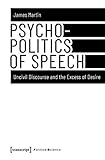Psychopolitics of Speech : Uncivil Discourse and the Excess of Desire / James Martin.
Material type: TextSeries: Edition Politik ; 40Publisher: Bielefeld : transcript Verlag, [2019]Copyright date: 2019Description: 1 online resource (186 p.)Content type:
TextSeries: Edition Politik ; 40Publisher: Bielefeld : transcript Verlag, [2019]Copyright date: 2019Description: 1 online resource (186 p.)Content type: - 9783839439197
- 153.6 23/eng/20230216
- online - DeGruyter
| Item type | Current library | Call number | URL | Status | Notes | Barcode | |
|---|---|---|---|---|---|---|---|
 eBook
eBook
|
Biblioteca "Angelicum" Pont. Univ. S.Tommaso d'Aquino Nuvola online | online - DeGruyter (Browse shelf(Opens below)) | Online access | Not for loan (Accesso limitato) | Accesso per gli utenti autorizzati / Access for authorized users | (dgr)9783839439197 |
Browsing Biblioteca "Angelicum" Pont. Univ. S.Tommaso d'Aquino shelves, Shelving location: Nuvola online Close shelf browser (Hides shelf browser)
Frontmatter -- Content -- Preface -- Introduction -- 1. Bodies of Speech -- 2. Voicing Desire -- 3. Talking to Excess -- 4. The Force of the Bitter Argument -- 5. An Ethics of Speech? -- Conclusion -- Bibliography
restricted access online access with authorization star
http://purl.org/coar/access_right/c_16ec
The human capacity for speech is forever celebrated as evidence of its innate civility. Why, then, is public discourse often - and today more than ever, it would seem - so uncivil, even delusional? The reason, argues James Martin in this timely book, lies in the way speech works to organise desire. More than knowledge or rational interests, public speech services an unconscious urge for a lost enjoyment, stimulating an excess in subjectivity that moves us in body and mind.James Martin draws upon the work of psychoanalyst Jacques Lacan as well as other Continental thinkers to set out a new approach to the analysis of rhetoric and answer the troubling question of whether civil discourse can ever hope to escape its obscene underside.
Mode of access: Internet via World Wide Web.
In English.
Description based on online resource; title from PDF title page (publisher's Web site, viewed 26. Aug 2024)









